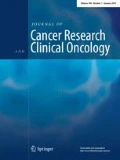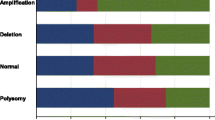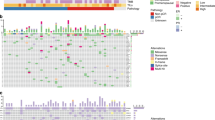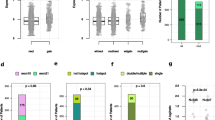Abstract
Purpose
The prevalence and clinical relevance of TP53 and PIK3CA mutations in pretreatment breast cancer have been previously reported. However, little is known regarding these mutations in residual tumor tissues after neoadjuvant chemotherapy. Here, we investigated the association between TP53 and PIK3CA mutations in residual disease and survival of breast cancers.
Methods
TP53 and PIK3CA somatic mutations were examined in 353 post-neoadjuvant chemotherapy residual tumor tissues by Sanger sequencing. Survival curves of patients with TP53 and PIK3CA mutations were compared using the Kaplan–Meier method.
Results
Fifty-six (15.9%) of the 353 patients carried a TP53 somatic mutation and 79 patients (22.4%) carried a PIK3CA somatic mutation. A total of 18 patients carried co-mutation of TP53 and PIK3CA. Patients with somatic co-mutation were more likely to have high-grade tumors (35.3% vs. 10.6%, P = 0.010), estrogen receptor-negative tumors (55.6% vs. 26.7%, P = 0.009), progesterone receptor-negative tumors (61.1% vs. 30.5%, P = 0.008) and triple-negative tumors (35.3% vs. 13.3%, P = 0.025) compared with non-carriers. More importantly, co-mutation of TP53 and PIK3CA carriers had a significantly worse disease-free survival (DFS) and distant disease-free survival (DDFS) than non-carriers (5-year DFS: 58.0% vs. 83.2%, P < 0.001; 5-year DDFS: 70.3% vs. 86.4%, P = 0.024). Furthermore, in multivariate regression analysis, TP53 and PIK3CA co-mutation carriers showed a significantly worse DFS (adjusted hazard ratio = 3.70; 95% confidence interval, 1.79–7.63; P < 0.001).
Conclusions
Patients with somatic co-mutation of TP53 and PIK3CA were associated with unfavorable survival compared with non-carriers. Co-mutation of TP53 and PIK3CA could be used as a potential prognosis marker in post-neoadjuvant chemotherapy breast cancer patients.

Similar content being viewed by others
References
Adams JR, Xu K, Liu JC et al (2011) Cooperation between Pik3ca and p53 mutations in mouse mammary tumor formation. Cancer Res 71:2706–2717. https://doi.org/10.1158/0008-5472.CAN-10-0738
Balko JM, Giltnane JM, Wang K et al (2014) Molecular profiling of the residual disease of triple-negative breast cancers after neoadjuvant chemotherapy identifies actionable therapeutic targets. Cancer Discov 4:232–245. https://doi.org/10.1158/2159-8290.CD-13-0286
Berns EM, Foekens JA, Vossen R et al (2000) Complete sequencing of TP53 predicts poor response to systemic therapy of advanced breast cancer. Cancer Res 60:2155–2162
Cancer Genome Atlas N (2012) Comprehensive molecular portraits of human breast tumours. Nature 490:61–70. https://doi.org/10.1038/nature11412
Cizkova M, Susini A, Vacher S et al (2012) PIK3CA mutation impact on survival in breast cancer patients and in ERalpha, PR and ERBB2-based subgroups. Breast Cancer Res 14:R28. https://doi.org/10.1186/bcr3113
Cortazar P, Zhang L, Untch M et al (2014) Pathological complete response and long-term clinical benefit in breast cancer: the CTNeoBC pooled analysis. Lancet 384:164–172. https://doi.org/10.1016/S0140-6736(13)62422-8
Croessmann S, Wong HY, Zabransky DJ et al (2017) PIK3CA mutations and TP53 alterations cooperate to increase cancerous phenotypes and tumor heterogeneity. Breast Cancer Res Treat 162:451–464. https://doi.org/10.1007/s10549-017-4147-2
Falette N, Paperin MP, Treilleux I et al (1998) Prognostic value of P53 gene mutations in a large series of node-negative breast cancer patients. Cancer Res 58:1451–1455
Isakoff SJ, Engelman JA, Irie HY et al (2005) Breast cancer-associated PIK3CA mutations are oncogenic in mammary epithelial cells. Cancer Res 65:10992–11000. https://doi.org/10.1158/0008-5472.CAN-05-2612
Jiang YZ, Yu KD, Bao J et al (2014) Favorable prognostic impact in loss of TP53 and PIK3CA mutations after neoadjuvant chemotherapy in breast cancer. Cancer Res 74:3399–3407. https://doi.org/10.1158/0008-5472.CAN-14-0092
Kalinsky K, Jacks LM, Heguy A et al (2009) PIK3CA mutation associates with improved outcome in breast cancer. Clin Cancer Res 15:5049–5059. https://doi.org/10.1158/1078-0432.CCR-09-0632
Kim C, Gao R, Sei E et al (2018) Chemoresistance evolution in triple-negative breast cancer delineated by single-cell sequencing. Cell 173:879–893 e813. https://doi.org/10.1016/j.cell.2018.03.041
Li SY, Rong M, Grieu F et al (2006) PIK3CA mutations in breast cancer are associated with poor outcome. Breast Cancer Res Treat 96:91–95. https://doi.org/10.1007/s10549-005-9048-0
Lopez-Knowles E, O’Toole SA, McNeil CM et al (2010) PI3K pathway activation in breast cancer is associated with the basal-like phenotype and cancer-specific mortality. Int J Cancer 126:1121–1131. https://doi.org/10.1002/ijc.24831
Ogston KN, Miller ID, Payne S et al (2003) A new histological grading system to assess response of breast cancers to primary chemotherapy: prognostic significance and survival. Breast 12:320–327
Olivier M, Langerod A, Carrieri P et al (2006) The clinical value of somatic TP53 gene mutations in 1,794 patients with breast cancer. Clin Cancer Res 12:1157–1167. https://doi.org/10.1158/1078-0432.CCR-05-1029
Penault-Llorca F, Radosevic-Robin N (2016) Biomarkers of residual disease after neoadjuvant therapy for breast cancer. Nat Rev Clin Oncol 13:487–503. https://doi.org/10.1038/nrclinonc.2016.1
Perez-Tenorio G, Alkhori L, Olsson B et al (2007) PIK3CA mutations and PTEN loss correlate with similar prognostic factors and are not mutually exclusive in breast cancer. Clin Cancer Res 13:3577–3584. https://doi.org/10.1158/1078-0432.CCR-06-1609
Silwal-Pandit L, Vollan HK, Chin SF et al (2014) TP53 mutation spectrum in breast cancer is subtype specific and has distinct prognostic relevance. Clin Cancer Res 20:3569–3580. https://doi.org/10.1158/1078-0432.CCR-13-2943
Spring L, Greenup R, Niemierko A et al (2017) Pathologic complete response after neoadjuvant chemotherapy and long-term outcomes among young women with breast cancer. J Natl Compr Canc Netw 15:1216–1223. https://doi.org/10.6004/jnccn.2017.0158
Stephens PJ, Tarpey PS, Davies H et al (2012) The landscape of cancer genes and mutational processes in breast cancer. Nature 486:400–404. https://doi.org/10.1038/nature11017
Symmans WF, Peintinger F, Hatzis C et al (2007) Measurement of residual breast cancer burden to predict survival after neoadjuvant chemotherapy. J Clin Oncol 25:4414–4422. https://doi.org/10.1200/JCO.2007.10.6823
Thakur B, Ray P (2016) p53 Loses grip on PIK3CA expression leading to enhanced cell survival during platinum resistance. Mol Oncol 10:1283–1295. https://doi.org/10.1016/j.molonc.2016.06.006
Van Keymeulen A, Lee MY, Ousset M et al (2015) Reactivation of multipotency by oncogenic PIK3CA induces breast tumour heterogeneity. Nature 525:119–123. https://doi.org/10.1038/nature14665
Wang Y, Xu Y, Chen J et al (2016) TP53 mutations are associated with higher rates of pathologic complete response to anthracycline/cyclophosphamide-based neoadjuvant chemotherapy in operable primary breast cancer. Int J Cancer 138:489–496. https://doi.org/10.1002/ijc.29715
Yates LR, Gerstung M, Knappskog S et al (2015) Subclonal diversification of primary breast cancer revealed by multiregion sequencing. Nat Med 21:751–759. https://doi.org/10.1038/nm.3886
Yuan H, Chen J, Liu Y et al (2015) Association of PIK3CA mutation status before and after neoadjuvant chemotherapy with response to chemotherapy in women with breast cancer. Clin Cancer Res 21:4365–4372. https://doi.org/10.1158/1078-0432.CCR-14-3354
Acknowledgements
This work was supported by the 973 Project (2013CB911004) and the Science Foundation of Peking University Cancer Hospital (2017-8).
Author information
Authors and Affiliations
Corresponding authors
Ethics declarations
Conflict of interest
The authors declare that they have no conflict of interest.
Ethical approval
The study was conducted in accordance with Helsinki Declaration, and was approved by the Research Ethics Committee of Peking University Cancer Hospital.
Informed consent
Written informed consent was obtained from all participants.
Additional information
Publisher’s Note
Springer Nature remains neutral with regard to jurisdictional claims in published maps and institutional affiliations.
Electronic supplementary material
Below is the link to the electronic supplementary material.
Rights and permissions
About this article
Cite this article
Chen, X., Guo, Y., Ouyang, T. et al. Co-mutation of TP53 and PIK3CA in residual disease after neoadjuvant chemotherapy is associated with poor survival in breast cancer. J Cancer Res Clin Oncol 145, 1235–1242 (2019). https://doi.org/10.1007/s00432-019-02873-8
Received:
Accepted:
Published:
Issue Date:
DOI: https://doi.org/10.1007/s00432-019-02873-8




